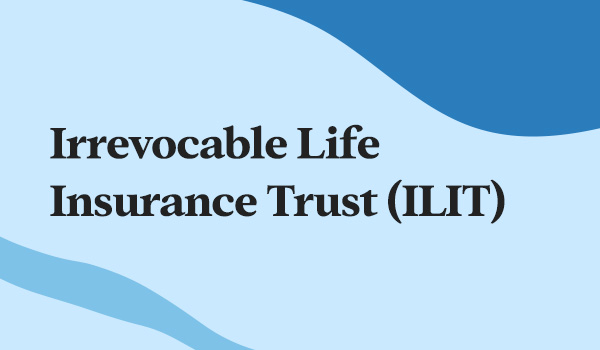Irrevocable life insurance trusts (ILITs, pronounced “EYE-lits”) can fit into a broader strategy to protect your assets and maximize the benefits of your estate for your heirs. An ILIT may be appropriate if you find yourself in any of several situations:
- You are well-off and expect your estate to be taxable at the federal and/or state level (Find out if you have a taxable estate here)
- When you include the full amount of your life insurance coverage, your estate would be taxable at the federal and/or state level
- You plan to leave a meaningful amount of money to your loved ones, and you want that money handled according to your specifications, even after you are gone
- You have a special needs child
- You have a loved one who may need to access government benefits
People in the situations above often use ILITs to achieve some combination of these goals:
- Minimize estate taxes
- Efficiently plan for and pay for estate taxes
- Transfer wealth to future generations
- Protect assets from creditors, lawsuits, and financial predators
- Maintain access to government benefits
What is an irrevocable life insurance trust (ILIT)?
Let’s take it word-by-word:
Trust = a fiduciary agreement that allows one party (the “trustee”) to manage assets for the benefit of others (the “beneficiaries”). Assets are contributed to the trust by the person who gifted or granted the assets (the “grantor”).
Irrevocable = a gift to an irrevocable trust is permanent, and you cannot take it back. This stands in contrast to a “revocable” trust, which can be easily unwound or revised at any time.
Life Insurance = when an irrevocable trust is set up for the primary purpose of owning a life insurance policy, it is called an ILIT. Other types of trusts can own life insurance, too (dynasty trusts, charitable remainder trusts, spousal lifetime access trusts, etc.).
When setting up an ILIT, an individual or a couple typically gets a life insurance policy on themselves, and that policy is owned by the trust. A third party serves as the trustee and ensures that, upon the death(s) of the insured(s), the death benefit is managed according to the terms of the trust, to benefit the beneficiaries named by the trust.
What types of life insurance can an ILIT hold?
An ILIT can hold any type of life insurance. It’s best to work with a qualified estate planning attorney and a smart, ethical insurance brokerage agent to make sure that the type of life insurance policy you are putting into an ILIT is well-suited to go there and that you are not missing an opportunity to smartly house an insurance policy in an ILIT.
Sometimes, the goals people have in buying certain types of life insurance policies do not sync very well with your standard ILIT, and—if you need an ILIT at all—special care needs to be taken to draft the ILIT correctly to ensure that the insurance policy achieves your goals without triggering any adverse consequences.
Here at AboveBoard, we are happy to communicate with you and your attorney to ensure that everyone is working together to meet your objectives.
Do you need to be wealthy for an ILIT to make sense?
Usually, but not always. While ILITs are popular for estate planning for wealthy individuals and families, they can also be useful for people who have a taxable estate at the state level (find out about your state here). The thresholds in some states are so low that people who do not think of themselves as well-off would still owe estate and/or inheritance tax.
An ILIT can also be useful for providing ongoing support to a loved one with special needs or an aging person who may need to access government benefits in the future.
How does an ILIT reduce estate taxes?
A properly structured ILIT removes the assets it owns from your taxable estate, so they are not counted as part of your estate upon your death.
Let’s say you have a taxable estate and expect to owe $10 million in estate taxes at the U.S. federal level. If you planned to pay for the estate tax from within your estate, your heirs would need to use $16.7 million in assets and pay 40% taxes (at current U.S. federal estate tax rates) to have $10 million to pay the estate tax bill on the rest of your estate.
By planning for the estate tax bill to be paid from an ILIT, rather than assets from within your estate, you need less money to satisfy the tax bill: $10 million in assets is $10 million available to satisfy the estate tax bill. With proper planning, you save your loved ones or causes you support $6.7 million in this example.
Pay Taxes from Your Estate Pay Taxes from an ILIT
ILITs for individuals who need ongoing care and support
Whether you are planning for a child with special needs or an aging parent who may need to access Medicaid at some point in the future, an ILIT can be part of the strategy. The removal of assets from an individual’s ownership means that the assets are often not counted when determining eligibility for government assistance.
ILITs as a protection mechanism for your loved ones
Regardless of whether you have a taxable estate or not, and regardless of whether anyone you love has special needs or may need to access government support, an ILIT can be helpful in situations where you wish to protect assets from creditors, lawsuits, and financial predators. By housing assets in an ILIT, you can take them out of the reach of people who may seek to seize those assets.
Always ask: is this life insurance policy for this ILIT really the best one?
Putting a life insurance policy into an ILIT doesn’t make it any less important to choose the correct policy for your goals. At AboveBoard we often see people who have received sales pitches for life insurance policies that are not their best option. Sometimes someone is being pitched an individual whole life policy when a survivorship guaranteed universal life policy would best meet their goals. Other times, it’s the opposite. What people get pitched is often a function of what maximizes compensation of that other agent, rather than what actually makes sense for the client.
Here at AboveBoard, our advanced planning agents can help you craft a strategy that places your best interests first and help you go into it with a clear understanding of why this strategy is the best one for your unique situation and goals. We take a collaborative, transparent approach and coordinate with any members of your supporting team—estate planning attorneys, tax advisors, and/or financial advisors—to get things done in the best possible way. And if you feel like your team is missing anyone, we are always happy to offer ideas of outstanding, ethical professionals for your consideration. We’re here to help you get this done.






